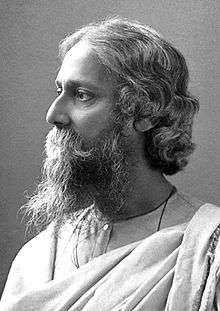Chitto Jetha Bhayshunyo
Chitto jetha bhoyshunyo (Where the mind is without fear) is a poem by written by Rabindranath Tagore before India's independence. It represents Tagore's vision of a new and awakened India. The original Bengali language poem was published in 1910 and was included in the 1910 collection Gitanjali and, in Tagore's own translation, in its 1912 English edition.
English text
- Where the mind is without fear and the head is held high;
- Where knowledge is free
- Where the world has not been broken up into fragments
- By narrow domestic walls
- Where words come out from the depth of truth;
- Where tireless striving stretches its arms towards perfection;
- Where the clear stream of reason has not lost its way
- Into the dreary desert sand of dead habit;
- Where the mind is led forward by thee
- Into ever-widening thought and action;
- Into that heaven of freedom, My Father, let my country awake.
Bengali text
চিত্ত যেথা ভয়শূন্য, উচ্চ যেথা শির, জ্ঞান যেথা মুক্ত, যেথা গৃহের প্রাচীর আপন প্রাঙ্গণতলে দিবসশর্বরী বসুধারে রাখে নাই খণ্ড ক্ষুদ্র করি, যেথা বাক্য হৃদয়ের উত্সমুখ হতে উচ্ছ্বসিয়া উঠে, যেথা নির্বারিত স্রোতে দেশে দেশে দিশে দিশে কর্মধারা ধায় অজস্র সহস্রবিধ চরিতার্থতায়, যেথা তুচ্ছ আচারের মরুবালুরাশি বিচারের স্রোতঃপথ ফেলে নাই গ্রাসি... পৌরুষেরে করে নি শতধা, নিত্য যেথা তুমি সর্ব কর্ম চিন্তা আনন্দের নেতা, নিজ হস্তে নির্দয় আঘাত করি, পিতঃ; ভারতেরে সেই স্বর্গে করো জাগরিত॥
History and translation
This poem was most likely composed in 1900. It appeared in the volume Naivedya in the poem titled "Prarthona" (July 1901, Bengali 1308 Bangabda). The English translation was composed around 1911, when Tagore was translating some of his work into English after a request from William Rothenstein. It appeared as poem 35 in the English Gitanjali, published by the Indian Society, London, in 1912.[1] In 1917, Tagore read out the English version (then titled 'Indian Prayer') at the Indian National Congress session in Calcutta.[2]
As in most of Tagore's translations for the English Gitanjali, almost every line of the English rendering has been considerably simplified. Line 6 in the English version omits a reference to manliness (পৌরুষ, pouruSh), and the stern ending of the original, where the father is being enjoined to "strike the sleeping nation without mercy" has been softened.
This poem often appears in textbooks in India and is also popular in Bangladesh.
Popular culture
A R Rahman composed an Indian Independence Day tribute song 'Jagao Mere Des Ko' in 2013 featuring the poem, with Suchi and Blaaze, along with an ensemble from KM Music Conservatory. The song was featured in MTV Coke Studio 2013.[3]
Aamir Khan recited the Hindi version of the poem in the last episode of television show Satyamev Jayate.[4]
John Abraham recited the English Version of the poem in the movie Madras Cafe
The poem is featured in the 2013 Bengali movie Mishawr Rawhoshyo directed by Srijit Mukherji, based on the fictional character named Kakababu by Sunil Gangopadhyay.
The Progressive Rock band Sinister Symphony wrote their song 'Into That Heaven' based on this poem. Imogen Heap and Vishal-Shekhar based "Minds Without Fear" on Chitto Jetha Bhoyshunyo. It was featured on the first episode of the first season of The Dewarists.
During his address to the Indian Parliament in 2010, U.S. President Barack Obama quoted the lines of this poem.[5]
See also
References
- ↑ Sisir Kumar Das, ed. (1994). The English Writings of Rabindranath Tagore, v.1: Poems. Sahitya Akademi. p. 9
- ↑ Prabhat Kumar Mukhopadhyay, rabIndrajIbanIkathA, 1981, p.104
- ↑ http://www.dhakatribune.com/arts-amp-culture/2013/aug/15/r-rahman-recreates-tagore%E2%80%99s-song
- ↑ https://www.youtube.com/watch?v=hDYWvfv10aM
- ↑ http://articles.economictimes.indiatimes.com/2010-11-09/news/27622405_1_mani-bhavan-president-barack-obama-today-gandhiji
External links
- Quoted by the Prime Minister at VISHWA BHARATI UNIVERSITY (15-Dec-2001)
- Quoted at the 66th Session of the Indian History Congress
- Where the mind is without fear and the head is held high
- Where the Mind is Without Fear
- Bengali Songs - Rabindra Sangeet
